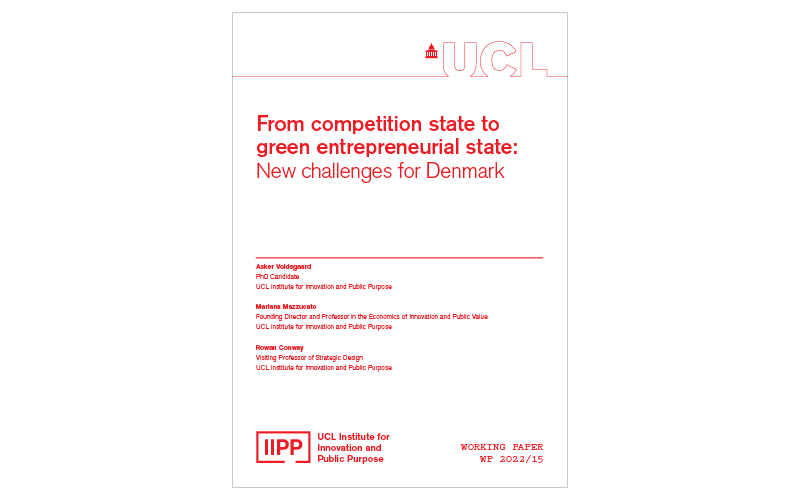From competition state to green entrepreneurial state: New challenges for Denmark
This paper analyses Denmark’s state model shift from a competition state towards a green entrepreneurial state. A shift that was instigated by the adoption of the new Climate Law in 2020.

1 May 2022
UCL Institute for Innovation and Public Purpose (IIPP) Working Paper Series: IIPP WP 2022/15
Authors:
- Asker Voldsgaard | PhD Candidate, UCL Institute for Innovation and Public Purpose
- Mariana Mazzucato | Founding Director and Professor in the Economics of Innovation and Public Value, UCL Institute for Innovation and Public Purpose
- Rowan Conway | Policy Fellow and Visiting Professor of Strategic Design, UCL Institute for Innovation and Public Purpose
Reference:
Voldsgaard, A., Mazzucato, M. and Conway, R. (2022). From competition state to green entrepreneurial state: New challenges for Denmark. UCL Institute for Innovation and Public Purpose, Working Paper Series (IIPP WP 2022-15). Available: https://www.ucl.ac.uk/bartlett/public-purpose/wp2022-15
Abstract:
While countries and corporations race to embrace net-zero carbon reduction targets, we face two immediate concerns. Firstly, even the most climate progressive countries are not ambitious enough (Anderson et al., 2020) and secondly, there is still uncertainty about their ability to achieve the targets. There is a circularity to these two challenges. Capable states can adopt more ambitious goals, while ambitious goals can galvanise states to invest in new institutional and economic capabilities to realise their goals. In this article, we examine how Denmark – widely recognized as a climate progressive country – is pursuing its climate goals. While tighter climate goals are warranted (KOR, 2022), we suggest the key for Denmark to both realise their goals and eventually tighten them is to transform the state model to that of a green entrepreneurial state, designed to foster structural and sustainable economic change. We therefore analyse Denmark’s state model shift from a competition state (Pedersen, 2011) towards a green entrepreneurial state (Mazzucato, 2015). A shift that was instigated by the adoption of the new Climate Law in 2020 that imposes legally binding decarbonisation targets (KEFM, 2021). A new state model entails new challenges for public policy making and implementation.
 Close
Close

